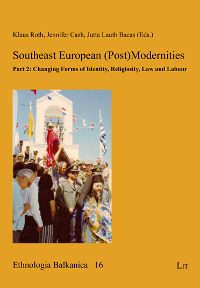The Proletarianisation of the Peasantry. A Narrative of Socialist Modernity in Albania
The Proletarianisation of the Peasantry. A Narrative of Socialist Modernity in Albania
Author(s): Olsi LelajSubject(s): Anthropology
Published by: LIT Verlag
Keywords: Albania; socialism; peasants; workers; collectivization; industrialization;
Summary/Abstract: The end of WW II in Albania saw the coming to power of the Communist Party led by Enver Hoxha which made the industrialisation and modernisation of the country a political priority of the state. On the one hand, the Marxist-Leninist ideology, adopted as the basic doctrine of the state, depicted the working class both as the leading engine of society toward socialism and as the force that held both the economic and the political power. On the other hand, after the war Albania was a devastated country, with a poor communication infrastructure, massive illiteracy, an economy mostly based on private ownership and agriculture, where the industrial sector of the economy was either destroyed by the war or virtually non-existent. According to official statistics Albania had 21.3 % of its population living in urban areas, and the remaining 78.7 % living in rural areas. Therefore this paper is about processes of transformation. It aims to narrate and explore Albania’s relation to socialism, the latter being one of the many faces of modernity, through the concept of proletarianisation, and how Albania’s working class was created during the “real existing socialism”. This diachronic approach will enable us to shed light on the specificity and dynamics of modernity and proletarianization in Albanian society.
Journal: Ethnologia Balkanica
- Issue Year: 2012
- Issue No: 16
- Page Range: 21-39
- Page Count: 19
- Language: English
- Content File-PDF

